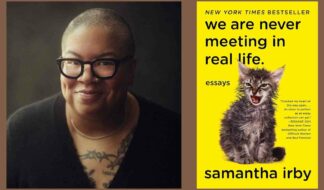New Cyndi Lauper Doc Brings Overdue Spotlight to Queer Ally
‘Let the Canary Sing’ captures a unique, era-defining star

Every era in our cultural memory has given rise to popular artists that helped to define them, but few can be said to have made as definitive an impact as Cyndi Lauper in the early ‘80s. Splashing onto our airwaves and across our television screens (courtesy of the newly minted MTV) with a defiantly upbeat and colorful blast of society-shifting energy, her proclamation that “Girls Just Want to Have Fun” caught the world off guard with a feminist anthem disguised as a good-time party song, and her sense of quirky punk style became an iconic influence over the “look” of an entire decade. In some ways, you could almost say Cyndi Lauper was the ‘80s.
For many people who grew up or came of age during her rise from unknown girl singer to pop music phenomenon, that might be the extent of their knowledge of her life and career. Despite the success (and Grammy Award) she achieved with her first few hits, the ever-roving eye of public attention inevitably moved on to the next new superstar, and her later efforts — while not exactly ignored — never managed to garner as much attention.
That doesn’t mean she has been inactive, though, as her die-hard fans (and there are many) well know; this is especially true in the queer community, where she has long been recognized and celebrated as a staunch ally – which is why it seems apt that Pride Month should coincide with the release of “Let the Canary Sing,” a new documentary profile of Lauper that is now streaming on Paramount+.
Directed by Emmy-winning documentarian Alison Ellwood, “Canary” takes its name from a comment made by the judge in a legal case that opened the door for Lauper’s stardom — no spoilers here, you’ll have to watch the movie to find out more. It undertakes the telling of a well-rounded and comprehensive life story to cast that stardom in a new light. Maintaining a comfortable sense of chronology, it begins with Lauper’s childhood, growing up in Brooklyn (and later, Queens) in a close-knit family as the middle child of three with a divorced single mother, and follows the trajectory of her life — rebellious, risk-taking teen to driven, passionate artist and activist — through her love of music, her rise to fame, her struggle to evolve in an industry that rewards predictable familiarity, her emergence as an LGBTQ+ advocate, and her expansion into a genre-leaping artist whose reach has extended beyond pop culture to earn her renown for her versatility.
The film also covers her accomplishment as the first woman to win a Tony Award as sole composer of the music and lyrics of “Kinky Boots,” the Harvey Fierstein-scripted drag-themed Broadway musical that made a star of Billy Porter — and nabbed her another Grammy (for its Original Cast Recording), to boot. Bolstered by extensive current interview footage with Lauper herself, as well as elder sister Elen, younger brother Fred, and other important figures from her personal and professional life, it finds an arc that reveals its subject as an authentic and uncompromising visionary dedicated to “lifting up” the entire human race.
That would sound hyperbolic — and probably more than a little disingenuous — if Lauper did not come across so palpably on camera. Whether it’s footage from a decades-old Letterman show or newly filmed commentary shot specifically for the film, her “true colors” come shining through (forgive us for that one, we couldn’t resist) to provide ample evidence that, even if she didn’t always know where she was going, she always knew it would be the direction of her own choosing.
Indeed, as the movie makes clear, much of the reason behind Lauper’s fade from the pop spotlight was the result of her refusal to repeat herself, to compromise her own path by delivering pale copies of the formula that had made her an “overnight success” after 15 years of trying. Although the documentary doesn’t insinuate this, it’s impossible for us not to suspect that homophobic backlash following her public embrace and advocacy of the queer community — something surely intertwined with her close bond to sister Elen, an out lesbian who is positioned in Ellwood’s film as a key pillar of both emotional and artistic support in Lauper’s life — may have had something to do with the mainstream music industry’s ambivalence toward her as she pursued her artistic impulses beyond the flashy appeal of her debut album.
In any case, “She’s So Unusual,” as a debut album title, proved to be an ironic foreshadowing of the very reasons she was unable to “stay in her own lane” well enough to remain in the good graces of a public (or, perhaps more truthfully, of record executives) that only wanted more of the same. Lauper has never been one to conform, and it’s made her vulnerable, like so many other unrelenting female voices both before and after her, to the mainstream insistence on reinforcement of the comfortable over the breaking down of boundaries.
“Let the Canary Sing” captures all of this succinctly, yet with layered and sophisticated nuance, as it pays its tribute to a pop icon whose seminal work has continued to resonate after more than 40 years. Unavoidably, perhaps, it sometimes feels like a “Behind the Music” episode or a “puff piece” for an artist about to launch a new project – indeed, Lauper announced a “farewell tour” of 23 cities, as well as a “companion piece” greatest hits album release, on the eve of the movie’s streaming debut. But it pushes past such irrelevant comparisons thanks to the palpable sincerity conveyed onscreen, not only from her, but from all the people in her orbit whose comments about her are included in the film.
Of course, it must be said that anyone who’s not a “Cyndi Lauper fan," whether by virtue of generational gaps or personal tastes, will probably not be drawn to watch a filmic love letter to her, and that’s a shame. It (and she) has the power to make viewers into true believers not only in her talent, but in her message of acceptance, inclusion and unconditional love. Part of that hinges on Ellwood’s skill as a filmmaker and teller of real-life stories, but the lasting impact rests on the persona of the star herself, who exudes a genuine air of transcendence and makes us not only feel instantly comfortable, but completely “seen” and validated, no matter who we are or which spectrum we might be on.
It’s hard to fake the kind of sincerity that makes that possible, and nothing about “Canary” suggests that Cyndi Lauper has any interest in being fake, anyway.
The National LGBT Media Association represents 13 legacy publications in major markets across the country with a collective readership of more than 400K in print and more than 1 million + online. Learn more here: nationallgbtmediaassociation.com









